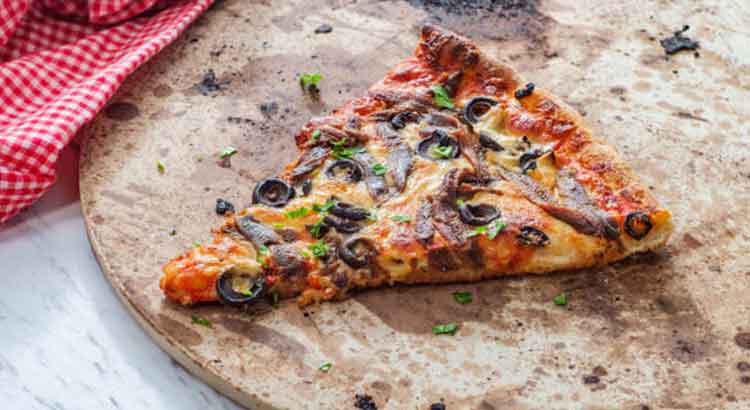Do you ever find yourself eagerly waiting for that mouthwatering pizza, only to be greeted by an unexpected sight—your pizza stone smoking away in the oven? It’s a scenario that can turn your pizza night into a smoky disaster.
The most common reason the pizza stone is smoking is excess moisture on the stone’s surface. When you place your pizza dough on a cold or wet stone, it can cause steam to form, resulting in that unwelcome smoke.
But fear not! In this article, we’ll delve into the seven most common problems that lead to a smoking pizza stone and provide you with practical solutions to fix them. From the choice of toppings to the temperature of your oven, we’ll help you unlock the secrets to achieving that perfect, smoke-free pizza. So, let’s unravel the mysteries behind your smoking pizza stone and get you back on track to pizza perfection!
Residual Food or Grease
If you’ve ever wondered why your pizza stone is smoking up a storm in your oven, one of the first culprits to consider is residual food or grease. This issue can sneakily linger on your pizza stone from previous baking sessions, and when subjected to the high heat of your oven, it transforms into an unwelcome smoky surprise.
To tackle this problem, start by giving your pizza stone a thorough cleaning. Ensure it’s completely cooled down before attempting any cleaning. Use a stiff brush or a plastic scraper to gently remove any food remnants. If you encounter stubborn spots, you can use a mixture of water and baking soda to scrub them away. Once your stone is clean, preheat it in the oven to make sure it’s entirely dry before placing your pizza on it. This should help eliminate the smoky issue caused by residual food or grease.
Excess Flour or Cornmeal
Excess flour or cornmeal on your pizza stone can also be a smoking culprit. While these ingredients are commonly used to prevent pizza dough from sticking to the stone, too much of a good thing can lead to smoke production.
To solve this problem, use a light touch when dusting your pizza stone with flour or cornmeal. You only need a thin layer to do the job. Excessive amounts can accumulate and burn, causing smoke. Additionally, make sure to preheat your stone adequately. The heat will help the flour or cornmeal cook onto the surface quickly, preventing it from becoming a smoke source. With these adjustments, you can enjoy a smoke-free pizza-making experience and savor your delicious creations without any unwanted surprises.
Excess Oil or Seasoning
Ever found your pizza stone smoking like a chimney? Excess oil or seasoning could be the sneaky culprits. While a well-seasoned stone can enhance your pizza’s flavor, too much oil or seasoning can turn your culinary adventure into a smoky ordeal.
To remedy this, ensure you apply a thin layer of oil or seasoning to your pizza stone. Too much oil can drip onto the oven’s heating elements and ignite, causing smoke. If your stone is already overly seasoned, give it a good scrub and reseason it with a light coating. Remember, moderation is key here. A well-balanced application of oil or seasoning will elevate your pizza-making without filling your kitchen with smoke.
Moisture in the Stone
If your pizza stone is puffing up with smoke, moisture trapped within the stone could be to blame. When exposed to high oven temperatures, any residual moisture within the stone can transform into steam and create an unwanted smoky spectacle.
To combat this, ensure your pizza stone is completely dry before use. After cleaning or if it’s been stored in a damp environment, allow it to air-dry thoroughly. You can also preheat your stone in the oven before placing your pizza on it. This helps drive out any remaining moisture and prevents it from turning into smoke during baking. With a dry and well-preheated stone, you can say goodbye to the pesky issue of excess moisture causing your pizza stone to smoke up.
Uneven Heating
Have you ever encountered the frustration of a smoking pizza stone due to uneven heating? This common issue can arise when your stone doesn’t heat up uniformly, causing certain areas to get too hot and smoke.
To resolve this, place your pizza stone on the middle rack of your oven and allow it to preheat thoroughly. This ensures even heating from all sides. Additionally, if you’re using a gas oven, consider using a pizza stone with a pizza stone heat diffuser or a pizza steel. These accessories distribute heat more evenly and reduce the chances of hot spots that lead to smoke. By addressing uneven heating, you can enjoy a smoke-free pizza-baking experience.
Poor Quality or Damaged Stone
Is your trusty pizza stone suddenly puffing out smoke? It might be due to the quality of the stone itself or any damage it has sustained over time.
To address this, invest in a high-quality pizza stone made from materials like cordierite or ceramic. These stones are less likely to smoke and heat more evenly. If your stone is already showing signs of wear and tear, it might be time for a replacement. Cracks or damage can trap moisture, oils, and food debris, leading to excessive smoke. A fresh, well-made pizza stone will elevate your pizza-making game and keep the smoke at bay.
Cooking Too High or Too Long
If your pizza stone is emitting more smoke signals than a campfire, the culprit might be excessive heat or an extended cooking time. Baking your pizza at too high a temperature or leaving it in the oven for too long can lead to a smoky situation.
To rectify this, start by checking your pizza recipe’s recommended temperature and cooking time. Most pizzas bake well between 450°F to 500°F (232°C to 260°C) for about 10-15 minutes. If your oven runs hotter than indicated, reduce the temperature accordingly. Overcooking your pizza can also dry out the ingredients, causing smoke. Ensure you follow the recommended cooking time and keep a close eye on your pizza as it bakes to prevent overdoing it.
Additionally, consider using a pizza peel to quickly transfer your pizza in and out of the oven. This minimizes the time your pizza spends on the hot stone, reducing the chances of excess smoke. By adjusting your cooking temperature and time and using a pizza peel, you can enjoy a perfectly baked pizza without the smoky side effects.
Final Thoughts
In the world of pizza making, a smoking pizza stone can be a pesky problem that takes away from the joy of creating your favorite pies. However, armed with the knowledge of common culprits and solutions, you can banish the smoke and enjoy delicious, home-baked pizza without any hiccups.
Remember, a clean and well-seasoned pizza stone is your ally. Excess oil, seasoning, or residual food can turn your stone into a smoke machine, so a little moderation and proper cleaning go a long way. Ensuring your stone is dry and preheated before use helps combat the moisture issue, while even heating and using quality materials prevent smoke-related woes.
Lastly, keep a watchful eye on your cooking temperature and time, and employ a pizza peel for efficient transfers. Armed with these tips, you can embark on your pizza-making adventures with confidence, leaving behind the smoke signals and savoring every slice. Happy pizza baking!
FAQ
Q: Can I use parchment paper with my pizza stone to prevent smoking?
A: Yes, you can use parchment paper to prevent smoking. Placing parchment paper between your pizza and the stone helps minimize direct contact, reducing the chances of any excess moisture, flour, or oil causing smoke. Just be sure not to exceed the parchment paper’s maximum temperature limit, typically around 450°F (232°C), to avoid potential fire hazards.
Q: What’s the best way to clean a smoking pizza stone?
A: To clean a smoking pizza stone, wait for it to cool down, then gently scrape off any residue with a stiff brush or plastic scraper. For stubborn spots, create a paste using water and baking soda, apply it to the stone, and scrub. Rinse off the paste and thoroughly dry the stone. Remember never to use soap, as it can be absorbed by the stone and affect the taste of your pizza.
Q: How can I season my pizza stone properly?
A: Properly seasoning your pizza stone involves applying a thin layer of cooking oil or vegetable shortening to its surface. Make sure your stone is clean and dry, then spread a thin layer of oil or shortening all over. Wipe off any excess with a paper towel. Place the stone in a cold oven and set it to the highest temperature your recipe requires. Leave it there for an hour, then turn off the oven and let the stone cool down inside. Repeat this process a few times to build up a good seasoning layer.
Q: Are there any alternatives to a pizza stone to prevent smoking?
A: Yes, there are alternatives to a pizza stone. You can use a pizza steel, which heats up quickly and provides excellent heat retention, resulting in crispy crusts. Another option is a cast-iron skillet or griddle, which can be preheated and placed in the oven to mimic the effects of a pizza stone. Just remember to heat any alternative thoroughly before placing your pizza on it to prevent smoking.
Q: What if I don’t have a pizza peel?
A: If you don’t have a pizza peel, you can use an inverted baking sheet or a cutting board dusted with flour or cornmeal as a makeshift peel. Place your prepared pizza on the floured surface and then slide it onto the preheated stone in the oven. This will help you transfer your pizza efficiently without the need for a dedicated peel.
Q: Why is my pizza stone cracking?
A: Pizza stones can crack due to rapid temperature changes, such as placing a cold stone in a hot oven or exposing a hot stone to cold water. To prevent cracking, always allow your stone to come to room temperature before using it in the oven and avoid sudden temperature shifts.
Q: Can I use my pizza stone on a grill?
A: Yes, you can use your pizza stone on a grill. It can enhance the flavor and texture of grilled pizzas. Just ensure your stone is suitable for grill use, preheat it on the grill, and follow the same precautions you would when using it in the oven to prevent smoking.
By addressing these frequently asked questions, you can navigate the world of pizza making with ease and confidence, ensuring your pizza stone enhances your culinary adventures without causing any unwelcome smoke. Happy baking!

